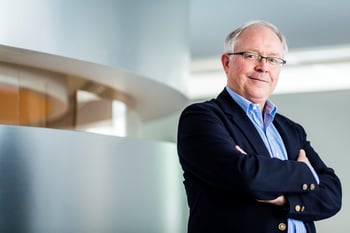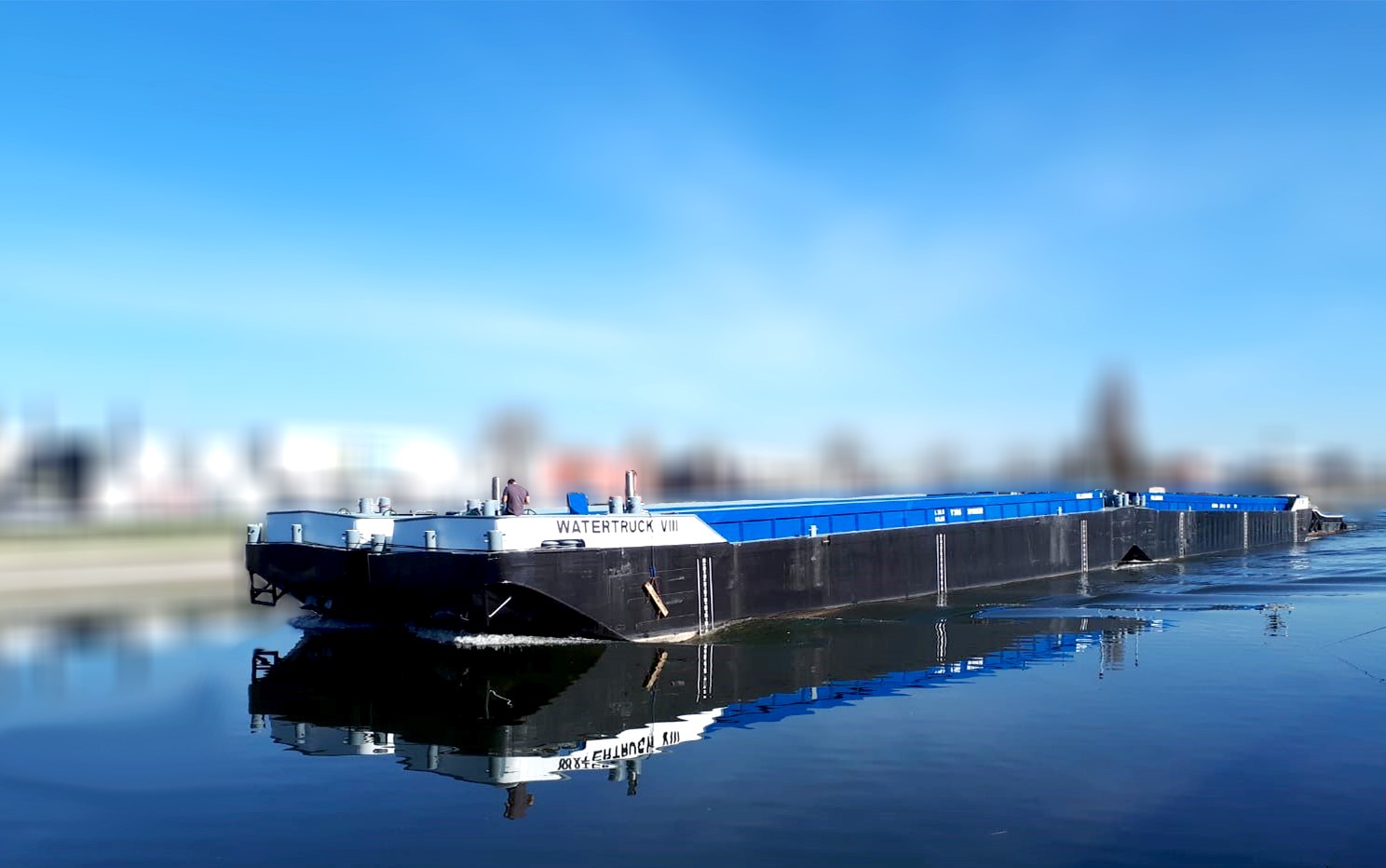The ambition of the European CEF project Watertruck+ was high: to develop inland navigation into a profitable and environmentally friendly alternative to road transport. The challenges turned out to be high too. But the project partners followed through and provided for concrete deliverables and valuable lessons learned. Group De Cloedt was one of the partners willing to pioneer. To Patrick Degryse, chairman of Group De Cloedt, it’s very clear: waterways are crucial if we want to keep our environment livable.
 Group De Cloedt is a family-owned group, active among other things in granulates, environmental and dredging works and sea and inland waterway logistics, both at home and abroad. When it comes to transport by water, they are not only fervent defenders but also one of the biggest private players. De Cloedt annually transports some 4 million tonnes of bulk goods via Flemish waterways.
Group De Cloedt is a family-owned group, active among other things in granulates, environmental and dredging works and sea and inland waterway logistics, both at home and abroad. When it comes to transport by water, they are not only fervent defenders but also one of the biggest private players. De Cloedt annually transports some 4 million tonnes of bulk goods via Flemish waterways.
The group has its own fleet but didn’t have any ships under 700 tonnes before the start of the project.
"We’re convinced that a modal shift to inland navigation is crucial."
Patrick Degryse is chairman of Group De Cloedt and is absolutely convinced of the crucial role of inland navigation: "We’ve been fully committed to inland navigation since the 1990s. 90% of our terminals are water-bound. In Belgium, we have terminals in e.g. Bruges, Ostend, Nieuwpoort, Izegem, Wielsbeke, Genk, Meerhout, Brussels and Wallonia. We’re convinced that a modal shift to inland navigation is crucial if we want to keep our environment and mobility livable. Just think of cities like Ghent: when carrying out construction works in the historic city center, all materials have to be brought in and out via small alleys, causing a huge nuisance for the local residents. Using small barges to supply and dispose of construction debris and materials could reduce nuisance."
But there is still a lot of work to be done before waterborne transport, especially via the small inland waterways, becomes a viable alternative: "The draught of the small waterways varies quite a bit, which is a serious drawback. For instance, if there’s just one small shallow section over a stretch of 50 kilometers, you need to adjust the entire transport process and limit the load. Regular dredging could do the trick, but that requires high maintenance budgets from the waterway authorities. And those budgets are not in proportion to a mode of transport that is currently underused because it isn’t profitable enough. So, it's a bit of a chicken and egg situation."
"The European inland navigation fleet is outdated and hardly equipped for sustainable propulsion."
"Draught is not the only problem, by the way. There's for instance a lot of waste to be found in our inland waterways as well. If the waste materials get stuck in the propellers, ships can get badly damaged. There’s also the combination with recreational use, which can be quite a challenge during summer, especially on the smaller waterways. And the current ships are usually only suitable for one type of cargo (e.g. bulk, pallets or containers), which means that investments in ships may lose value. In any case, the small European inland navigation fleet is outdated and hardly equipped for green/sustainable propulsion."

De Vlaamse Waterweg and Antwerp Management School joined forces to give inland navigation, and in particular the smaller waterways in Flanders, a boost through the European TEN-T project Watertruck+. Watertruck+ is a flexible logistics concept that offers an innovative answer to the bottlenecks mentioned above. Within the project, barges were developed that can be used both on large waterways in larger convoys and on small waterways in small convoys or self-propelled. The barges can be used for several types of cargo, they come with plug-and-play skids and are equipped for the new generation of diesel-electric propulsion.
"With the Watertruck+ barges we can now make the most of the smaller inland waterways."
Group De Cloedt was one of the first companies to respond to the call from De Vlaamse Waterweg to build Watertrucks and integrate them into their business operations. Although it was a very innovative and rather risky project with a high financial entry threshold, Group De Cloedt committed itself one 100%: "With Watertruck+ we’ll be able to transport even more goods flows via water. We didn’t have any ships under 700 tonnes yet. With the Watertruck+ barges we can now make the most of the smaller inland waterways. There have been some changes between the initial project ideas and the current concept. Thanks to De Vlaamse Waterweg and the Flemish government, who adapted legislation, we were able to carry out tests and experiments on smaller waterways. It gave us the opportunity to adjust the innovative concept and make it more efficient and profitable.”
"With Group De Cloedt we had 16 CEMT class 1 and 2 barges made, 4 of which are fully self-propelled. We’ve already used 2 CEMT-class 2 barges for the demolition of Pont des Trous in Tournai. Even more important: at the end of 2019, we started an experiment with “unmanned ships” on the Diksmuide-Ostend trajectory. The first tests were successful and since February 2020, we’ve been navigating this trajectory on a daily basis. In time, we hope to use several barges (without wheelhouse), which will be controlled by a single operator ashore. Only then will waterborne transport via small inland waterways in our opinion evolve toward a more cost-efficient and environmentally friendly alternative to road transport."
"Fortunately, the Flemish government and administration are really open to innovation."
"The concept of unmanned shipping still needs further tests, but I’m convinced that this is the way to go for small inland navigation. And autonomous shipping is also well on its way. Fortunately, the Flemish government and administration are really open to innovation. For example, the decree of 4/26/2019 on mobility and transport explicitly created room for innovation in shipping, making pilot projects with unmanned or autonomous ships possible on our waterways. This is unique in the world and a very important step for the transformation of the rather traditional sector of inland navigation."
"In addition, De Vlaamse Waterweg has created a number of support measures to make the Flemish inland navigation fleet greener. After all, new ecological energy sources and propulsion systems remain very expensive, but this type of measures reduce the risk for entrepreneurs. In order to further stimulate the modal shift to inland navigation, the Flemish government and local authorities could, for example, also motivate construction companies and suppliers to bring in and take out their goods by water. Or, as De Vlaamse Waterweg already does in tenders: award extra points for the use of waterways."
"A modal shift toward an innovative and environmentally friendly inland navigation is feasible, even with smaller ships."
"Too expensive, not efficient, not reliable enough, etc. are thus arguments that no longer hold these days. Of course, there are still many evolutions ahead of us, but with Watertruck+ we want to demonstrate that a modal shift toward an innovative and environmentally friendly inland navigation is feasible, even with smaller ships. Though the Watertruck+ trajectory admittedly was quite long (up to 5 years) and required a lot of effort on the part of all project partners.”
"We hope that the Watertruck+ project succeeds in convincing even more entrepreneurs to make the switch from road to waterborne transport."
"We hope to be able to further develop the technology toward the use of alternative energy sources such as LNG, hydrogen, biodiesel, batteries, etc. It’s key in this that Europe makes clear-cut choices and that a stimulating policy is put in place so that this transition can become a reality. Finally, we hope that the Watertruck+ project succeeds in convincing even more entrepreneurs to make the switch from road to waterborne transport.”



